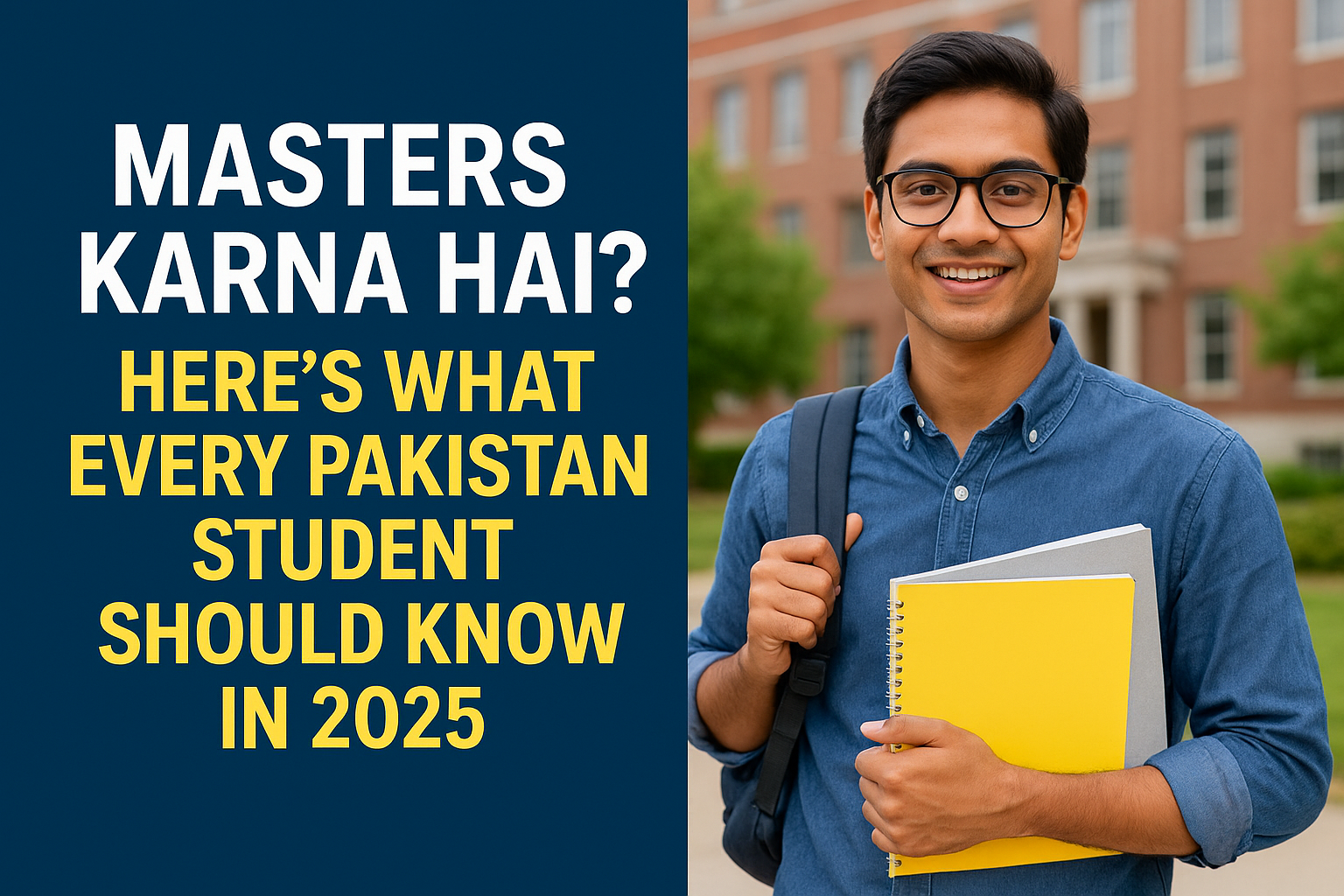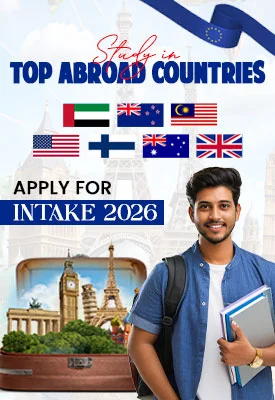Introduction
More Pakistani students are asking, “What’s next?” after graduation. For many, a master’s degree is the answer. It offers personal growth, better job prospects, and global exposure. Despite economic challenges and inflation, interest in foreign education is at an all-time high. Many aim to settle abroad, gain skills, or boost their CV. But the process can feel overwhelming with so many options. This guide is for Pakistani students planning a master’s in 2025. It will help you make informed decisions, choose the right country and course, understand scholarships and visas, and avoid common mistakes.
Choose the Right Country
Deciding where to study is a big step. The country should match your goals, budget, and plans. Here’s a breakdown of top choices for Pakistani students in 2025.
United Kingdom
Master’s programs are usually one year long. You get a two-year post-study work visa. However, tuition and living costs in cities like London are high. Look into Chevening, Commonwealth, or university scholarships to save money. Best for those wanting a short program and quick career growth.
Canada
Canada is popular for its permanent residency options. Many master’s programs lead to PR pathways. Scholarships and assistantships are available. Programs last 1.5 to 2 years with good job prospects. The visa process is straightforward if you apply early. Best for students seeking long-term settlement.
Australia
Australia offers flexible student visa rules and work rights. Its job market is stable, and universities are diverse. Costs are similar to Canada. Check out Destination Australia or university-specific scholarships. Best for quality education and a multicultural environment.
United States
The US has top universities, especially in tech, business, and law. Visa approvals are competitive for Pakistanis, and funding is limited. Tuition and living costs are high. Best for students aiming for elite academics who can handle visa challenges.
Budget-Friendly Options
For affordability, consider Germany, where public universities have low or no tuition, especially in STEM. Sweden offers scholarships and innovative programs. Malaysia has cost-effective, English-taught courses and a familiar culture. Best for students seeking quality education on a budget.
When choosing, think about your field, budget, work opportunities, and visa approval rates.
Field Selection: Law, Tech, Business, or Something New?
Choosing your field is critical. Should you stick to your bachelor’s field or try something new?
Continuing in the Same Field
Sticking to your field, like an LLM after LLB, deepens expertise. It strengthens your job profile and opens specialized or teaching roles. Best for those passionate about their current path.
Switching Fields
Some students switch from law or humanities to tech, data, or business. An MBA after law suits leadership or corporate roles. Moving to data science or tech works if you have analytical skills. Universities often accept field changes if your Statement of Purpose shows clear intent and skills. Best for those wanting high-growth sectors or feeling disconnected from their degree.
In-Demand Fields for 2025
To make your degree worthwhile, consider booming industries:
– Artificial Intelligence: Powers automation and chatbots.
– Cybersecurity: Companies need protection.
– Data Science: Data skills are highly sought after.
– Climate & Sustainability: Green jobs are growing.
– Financial Technology: Pakistan’s digital banking is expanding.
– Public Policy: Great for law or social science students.
– Healthcare Management: Driven by digital health trends.
Not sure what fits? Ask yourself: What excites you? What’s trending globally? Where do your skills align? Try short online courses in AI, finance, or UI/UX to test your interests.
Exams & Language Requirements
Entrance and language exams are the first step for studying abroad. Here’s what you need.
IELTS / TOEFL
Most universities require English proficiency tests. IELTS scores range from 0–9, with 6.5–7.0 typically needed. TOEFL scores range from 0–120, with 85–100+ required. Practice with free mock tests on IELTS Liz or British Council. Focus on listening and speaking, often weaker areas for Pakistani students. Use apps like IELTS Prep or Magoosh. Scores are valid for two years.
GRE / GMAT
GRE is needed for US programs like engineering or data science. GMAT is for MBA or business analytics at top schools. Some Canadian and European universities accept GRE. Use free resources like Magoosh YouTube or ETS guides. Study in groups to stay motivated. Only prepare if your program requires it, as many are now test-optional.
Preparation Tips
Start studying 3–4 months before the test. Take weekly practice tests. Use free resources first to save money. Avoid relying on agents for prep. Strong scores improve visa approval chances.
Scholarships & Funding
“How will I pay for this?” is a common worry. Many scholarships are available for Pakistani students.
HEC Scholarships
The Higher Education Commission offers fully-funded scholarships, covering tuition, stipend, and travel. Check the HEC website regularly.
Chevening Scholarship (UK)
Fully funded by the UK, it covers tuition, flights, and living expenses. You need two years of work experience and leadership potential.
Commonwealth Scholarship (UK)
For Commonwealth countries like Pakistan, it supports master’s and PhD programs in UK public universities.
Fulbright Scholarship (USA)
Sponsored by USEFP, it’s fully funded and prestigious. A GRE score is required.
University Scholarships
Many universities offer partial tuition waivers or merit awards. Examples include University of Melbourne’s Graduate Research Scholarships, University of Toronto’s merit awards, Swedish Institute Scholarships, and Germany’s DAAD Scholarships. Check each university’s financial aid section.
Financial Planning
Create a budget for tuition, rent, visa fees, and more. Save early in a separate account. Explore HEC or bank loans like NBP or Meezan. Ask family for contributions. Avoid selling assets hastily. Use budgeting tools like Google Sheets or Wallet.
SOPs, LORs, and Applications
Applications can feel overwhelming, but they’re manageable with planning.
Statement of Purpose
Your SOP tells your story. Include who you are, what inspired you, your academic background, why this field and university, and your career goals. Be specific and avoid clichés. Use tools like Grammarly to polish it.
Letters of Recommendation
You need 2–3 LORs from{detachment from professors, internship supervisors, or job managers. Give them 2–3 weeks and share your CV and SOP for tailored letters. Avoid writing them yourself.
Application Deadlines
Fall 2025 deadlines are October 2024 to February 2025. Spring 2026 deadlines are June to September 2025. Track deadlines, documents, and fees in Excel or Notion.
Key Documents
Prepare your passport, transcripts, test scores, SOP, LORs, CV, and experience letters.
Visa Process & Mistakes
The visa process can be stressful, but preparation helps.
Visa Documents
You need a passport, acceptance letter, bank statement, transcripts, test scores, visa form, fee payment, medical insurance, photos, and sometimes a study plan or police certificate.
Common Mistakes
Don’t delay bank statements; funds need 3–6 months in the account. Book medical and biometric appointments early. Get documents attested. Avoid agents’ generic templates. Keep photocopies.
Visa Tips
Be confident in interviews. Explain why this country and university, and your future plans in Pakistan. Show ties to Pakistan like family or job prospects. Be honest to avoid fraud issues. Join forums like r/ukvisa or Pakistani student groups for tips.
Life Abroad
Studying abroad is exciting but challenging.
Culture Shock
Classrooms and social norms may differ. Professors are informal but expect independence. People may seem distant at first. Be open, attend events, and connect with others.
Part-Time Jobs
Common jobs include cafe work, food delivery, or on-campus roles. Each country has work-hour limits. Focus on studies first, as master’s programs are fast-paced.
Homesickness
You’ll miss family and Pakistani culture. Video call home, but not too much. Join Pakistani or desi communities. Budget carefully to avoid financial stress.
Support System
Make diverse friends. Connect with Pakistani seniors or mentors. Join student groups or volunteer to build confidence.
This guide aims to make your master’s journey clearer and achievable in 2025.
Need Guidance or Have Questions?
Feel free to reach out — we’re here to help you plan your master’s journey with clarity and confidence.
📱 Phone / WhatsApp: +92 321 8888850




